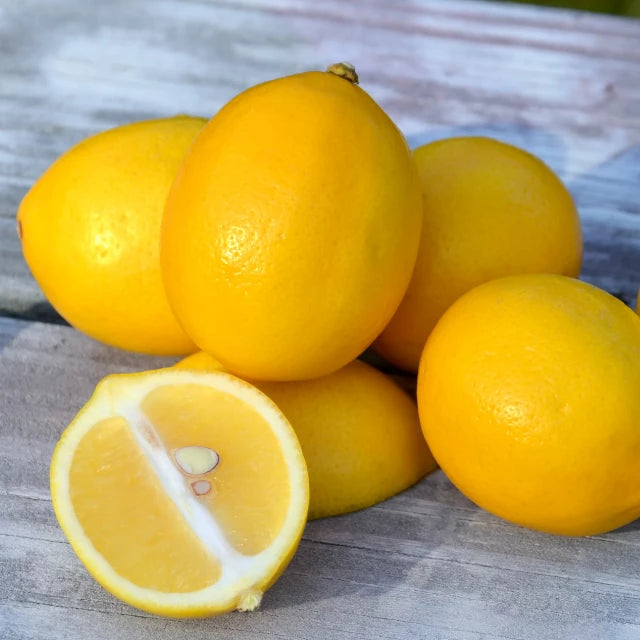Love it? Add to your wishlist
Your favorites, all in one place. Shop quickly and easily with the wishlist feature!
[message]
[title]
[message][subMessage]




Veliyath Gardens
Couldn't load pickup availability
— A Sweet, Fragrant Hybrid That Belongs in Every Kitchen and Courtyard —
Bright, round, and bursting with citrus fragrance, the Meyer Lemon is more than just a fruit—it’s a gardener’s treasure and a cook’s delight. With origins that trace back to China, this hybrid lemon has earned worldwide love for its distinct sweetness, subtle floral aroma, and incredible adaptability in home gardens. Known for producing juicy fruits year-round, the Meyer Lemon Live Plant (Citrus × meyeri) is an excellent choice for anyone who enjoys cultivating useful plants that also enhance the beauty of a space.
Botanical Name: Citrus × meyeri
Common Name: Meyer Lemon
Local/Regional References:
China: Believed to be its place of origin; known simply as “sweet lemon” in some regions
United States: Popularized in California as a garden and culinary staple
India: Sometimes referred to as Nimbu Hybrid or Sweet Lemon in nursery circles
Its smooth skin, gentle acidity, and year-round fruiting habit have made it a beloved citrus plant across continents.
Unlike standard lemons that are intensely acidic, the Meyer lemon offers a sweeter, more complex flavor. It stands apart in the citrus family due to its hybrid nature and vibrant color.
Hybrid between a citron and a mandarin/pomelo
Rounder shape compared to the typical oval lemon
Deep yellow to orange-hued peel with a glossy texture
Thinner, smoother skin that is edible and aromatic
Juicy flesh with a balanced, floral sweetness
Nearly seedless in many mature fruits
This unique composition makes it ideal for a wide variety of kitchen uses and adds charm to any edible garden.
Meyer lemons have earned their place in gourmet kitchens and home recipes alike for their distinct profile.
Flavor Profile:
Mild acidity with a natural sweetness
Hints of orange blossom and tangerine
Delicate fragrance with a floral undertone
Culinary Applications:
Used in desserts like lemon tarts, cheesecakes, and curds
Perfect for salad dressings and marinades
Sliced thin and candied or preserved whole
Zest is used for infusions, baked goods, and sauces
Juice is a popular base for lemonade, mocktails, and vinaigrettes
Its pleasant flavor allows it to pair well with both sweet and savory dishes, making it one of the most versatile citrus fruits.
Aside from taste, the Meyer lemon brings a host of health-boosting nutrients. It can be a simple yet powerful way to enhance your daily wellness.
Vitamin C: Supports immunity and collagen production
Antioxidants: Neutralizes free radicals, slows signs of aging
Potassium: Helps regulate blood pressure
Fiber: Aids digestion when consumed with peel or pulp
Flavonoids: Beneficial for heart health and anti-inflammatory effects
Natural Detoxifier: A squeeze of Meyer lemon in warm water each morning aids in liver function and digestion
Its gentle acidity makes it suitable even for those who are sensitive to regular lemons.
The Meyer lemon tree is known for its compact growth, making it an excellent choice for container gardening, balconies, or even sunny windowsills.
Tree Size: Grows to 5–8 feet in containers; up to 12 feet in open ground
Sunlight: Requires at least 6 hours of direct sunlight daily
Soil Preference: Well-draining loamy soil, enriched with compost
Watering: Regular but moderate watering; avoid waterlogging
Flowering: Produces fragrant white flowers followed by golden fruits
Fruit Bearing: Bears fruits up to 2–3 times a year in warm climates
Pruning Needs: Light pruning helps maintain shape and airflow
Pollination: Self-pollinating but benefits from pollinators like bees
Its low-maintenance nature makes it ideal for new gardeners and those seeking year-round garden productivity.
When to Harvest: When the peel turns deep yellow and fruit feels slightly soft to the touch
Shelf Life: Keeps fresh at room temperature for 1 week; refrigerate for longer storage
Preservation Ideas:
Zest can be dried or frozen
Juice can be frozen in ice trays
Whole lemons can be preserved in brine for Mediterranean recipes
Proper harvesting ensures maximum juice content and optimal sweetness.
In China, Meyer lemons have historically been symbols of health and longevity, gifted during New Year celebrations. Their golden hue is often associated with prosperity. In the United States, especially in California, Meyer lemons have become a backyard citrus favorite, valued for their beauty and flavor.
Their ornamental flowers and compact size have made them popular housewarming gifts, often seen as lucky plants that invite abundance and healing into homes.
At Veliyath Gardens, we invite you to bring home the Meyer Lemon Live Plant for a blend of charm, function, and fragrance. Whether you’re an urban gardener or managing a sprawling home orchard, this plant adapts beautifully and rewards generously.
Enhances garden aesthetics with evergreen foliage and bright fruit
Produces fragrant blooms that attract pollinators
Supports health, culinary creativity, and sustainability
A family-friendly plant, easy to care for and enjoy
Perfect for gifting or growing in decorative containers
Choosing the Meyer Lemon is choosing flavor, fragrance, and freshness—all from your own backyard.
Sunlight: Requires at least 6 hours of direct sunlight daily
Soil Preference: Well-draining loamy soil, enriched with compost
Watering: Regular but moderate watering; avoid waterlogging
Flowering: Produces fragrant white flowers followed by golden fruits
Vitamin C: Supports immunity and collagen production
Antioxidants: Neutralizes free radicals, slows signs of aging
Potassium: Helps regulate blood pressure
Fiber: Aids digestion when consumed with peel or pulp
Enhances garden aesthetics with evergreen foliage and bright fruit
Produces fragrant blooms that attract pollinators
Supports health, culinary creativity, and sustainability
A family-friendly plant, easy to care for and enjoy




